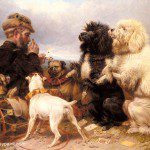Yesterday I wrote about dogs and forgiveness.
If we want to be happy, we need this lesson from dogs. In his book Stay, Dave Burchett cites University of Michigan psychologist Christopher Peterson, who finds that of all the virtues “[f]orgiveness is the behavior most strongly linked to happiness.” This should not surprise us. Jesus said that if we choose not to forgive others, God will not forgive us (Mt 6:15). Paul commands us to forgive “one another as God in Christ forgave you” (Eph 4:32). If we do not forgive, then we are not reconciled with God, and our deepest connection with Love itself has been broken. With that connection severed, it is no wonder that we will have trouble finding the peace and joy necessary for true happiness. Dogs can help us forgive by showing how they forgive us. Or, to put it another way, by being types of forgiveness to us.
Dogs don’t automatically demonstrate all these virtues, however. Like us, they need training. Elizabeth Haysom is a dog-trainer at a prison in Virginia. Incarcerated with a 90-year sentence, she is a dynamic Christian who inspires all who know her. Haysom says she sees many Kingdom principles illustrated by the dogs with whom she works. One set of principles has to do with the way they learn obedience.
When training a dog, we build the behavior slowly step by step. We don’t expect a dog to magically understand what “stay” means. We build a habit of a good stay. And a good stay is one that holds through distractions (people, food, toys, other animals), distance (being out of sight), and duration (several minutes). Even the stay that holds through different trainers who have different meanings for the word.
Haysom observes that we need to train in the virtues over months and years, and that it often must proceed step by step. Maturity never comes overnight. She observes that Christians will make mistakes and fail, just like dogs. But just as trainers don’t let a dog quit, so too we should not let our failures excuse us from training in godly habits and attitudes.
Elizabeth has found that any dog can be trained, even those wounded by cruel masters. But they must be trained with love and a sense of partnership. Rather than using a choke collar and punishment, she teaches her dogs—many of whom came from abusive situations–rules and obedience with praise, massage, and food. But dog breeds are different, and different breeds have different skills and gifts. So while all dogs get tired and need rest, for example, they get that rest in different ways. One dog likes to take a break by chewing, another by chasing a ball, still another with a nap. Others are comforted by getting a good sniff of something nasty, or by putting their head in someone’s lap. A good trainer watches his dog when he rests to see what he prefers. He won’t condemn the dog for not wanting to nap if he gets his rest by chewing.
So too, she observes, in the Body we all have different gifts and inclinations. We should not condemn our brothers or sisters if they don’t like what we like, or don’t prefer our kind of spirituality. Differences in dog breeds and even among members of the same breed can help remind us to be forgiving and accepting of differences among members in the Church. “Now there are varieties of gifts, but the same Spirit. . . . If the foot should say, ‘Because I am not a hand, I do not belong to the body,’ that would not make it any less a part of the body” (1 Cor 12:4, 15). Just as good dog trainers recognize God-given diversity among dogs, we should recognize that God has purposely made his people different. Rather than resent that fact when differences make us uncomfortable, we should celebrate it.
Elizabeth says the most important cue she teaches a dog is the recall. “It can save the dog’s life.” By this she means the skill of coming when called, no matter what else is happening or what it costs. Just like people, dogs don’t like to leave what they are doing. Whatever they are enjoying at the moment seems more important or fun than coming to the trainer. So Elizabeth uses rewards—the best food treats, the dog’s favorite toy, romping fun, or even the chance to get back to what he was previously enjoying—to teach the dog that coming to a command is always the best thing to be done.
This should sound familiar. Jesus said his sheep know his voice (Jn 10:3-5). They come to him when he calls, which means they obey, even when wandering in disobedience might seem more enjoyable. But the obedience is all-important. It proves their love, and is rewarded by both the Father and the Son. “Whoever has my commandments and keeps them, he it is who loves me. And he who loves me will be loved by my Father, and I will love him and manifest myself to him” (Jn 14:21 ESV).












